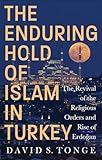The enduring hold of islam in turkey : the revival of the religious orders and rise of erdoğan / By David S. Tonge
Publication details: London C. Hurst & Co. 2024Description: xix, 376 pages 22 cmISBN:- 9781911723837 (Hardback)
- 297.4809561
| Item type | Current library | Shelving location | Call number | Materials specified | Status | Notes | Barcode | |
|---|---|---|---|---|---|---|---|---|
 BOOKs
BOOKs
|
National Law School | New Arrival - Display Area | 297.4809561 TON (Browse shelf(Opens below)) | HB | Not For Loan | Recommended by Mr. Sidharth Chauhan | 40399 |
Browsing National Law School shelves,Shelving location: New Arrival - Display Area Close shelf browser (Hides shelf browser)
List of Illustrations -
Acknowledgements -
Note on Spelling -
Preface -
Introduction -
Part One Origins:
1. Abdülhamid II: Religion and Power -
2. The Young Turks and the Years of Siege -
Part Two Incubation:
3. Faith and Secularism in the New Republic -
4. Post-war: The Revival of the Past -
5. The Nakşibendis: On the Path of the Masters -
Part Three Flowering:
6. Industrializing Turkey and the Erosion of Secularism -
7. İskenderpaşa and the Rise of Political Islam -
8. The Turkish-Islamic Synthesis and the Patrician Erenköy Community -
10. Menzil and the Işıkçıs: The Lure and Risk of Mammon -
11. The Apostles of Nursi: A Rainbow of Light -
12. Gülen and Five Decades of Guile -
13. Coup and Purge -
Part Four Harvest—Monoculture:
14. The New Turkey -
15. Erdoğan Regnant -
16. The Century of Türkiye -
Annexes -
Glossary -
Notes -
Bibliography -
Index.
This is the first account in English of how Islamic religious orders dating back to Ottoman times have risen to dominate and define the future of Turkey, Europe's awkward neighbour and the major power in the Eastern Mediterranean. Given its determined programme of secularising the people both under and after the Atatürk regime, Turkey is often projected as a model for the compatibility of Islam with parliamentary democracy. In this absorbing book, journalist and writer David S. Tonge reveals the limitations of that secularisation, and its progressive reversal, in what continues to be a profoundly religious country. He describes how Muslim Turks' religious identity has been taken over by branches of one of Islam's great religious orders, the Naqshbandis, whose profoundly anti-Western ethos was honed by British and French colonial incursions into the heartland of their faith. Tonge's history offers a salutary alternative to the wishful narrative developed by Western chancelleries during the Cold War, one which viewed Turkey as a westernising democracy. The revival of both Turkish nationalism and Islam helped President Erdoğan's rise to power, and will shape the regime that succeeds him--illuminating and understanding Turkey's realities of faith and religious politics has never been more important.
There are no comments on this title.







